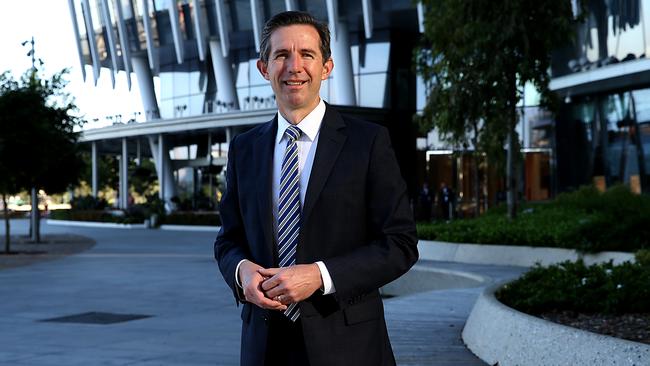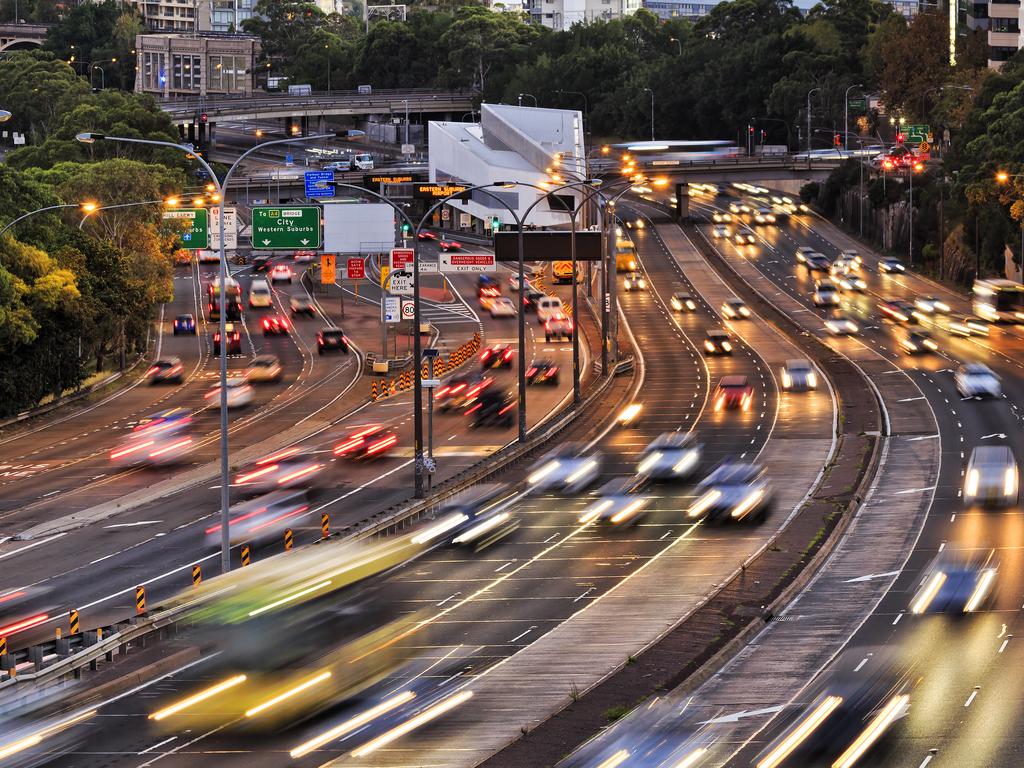Jobless bill plunges to historic low: Simon Birmingham
The unemployment welfare bill is set to plummet, with the budget revealing almost 200,000 fewer people claiming the dole by 2023 than forecast last year.

Australia’s unemployment welfare bill is set to plummet, with next week’s budget revealing almost 200,000 fewer people claiming the dole by 2023 than forecast last year, as the government frames an election contest with Labor over spending restraint and budget repair.
In an interview with The Australian, Finance Minister Simon Birmingham said the number of JobSeeker recipients was projected to hit historically low levels.
Senator Birmingham on Tuesday also left the door open to a temporary cut to fuel excise as a bowser fix for cost-of-living pressures and hinted that the pandemic-induced $1 trillion debt bill would be avoided.
While the federal government last year legislated a rise in Jobseeker payments of $50 a fortnight, the overall taxpayer burden was forecast to fall. JobSeeker numbers were on track to dip under pre-pandemic levels by the end of 2022-23, with the unemployment rate expected to drop under 4 per cent within months.
“In terms of JobSeeker numbers, and therefore JobSeeker payments as a share of payments and share of the economy, we are trending towards historic lows in the amount that other taxpayers are having to contribute towards the safety net for Australians out of work,” Senator Birmingham said.
“That is one of the fundamental dividends of a strong economy: that low unemployment rates give us the double bonus of lower payments on social safety net and higher revenue from Australians contributing and therefore paying taxes as part of those contributions.”
Senator Birmingham said the budget would set up the election contest between the Coalition and Labor as a choice between targeted support to address cost-of-living pressures and “reckless” spending.
“In this budget, whilst addressing those pressures, we’ve also been very mindful about the need to be responsible by ensuring other measures are temporary (and), where possible, highly targeted,” the Finance Minister said.
“(What) we will be outlining is a stark contrast to the reckless structural and ongoing spending promises you’ve got from Labor when they talk about virtually free childcare, free TAFE or huge increases in paid parental leave or refugee intakes, which have ongoing and structural implications to the budget.”
Surging revenue from tax receipts and record resources prices will help significantly trim debt and deficit trajectories over the medium-term outlook.
“It’s still too early to say with confidence that the budget can hit balance in the foreseeable future, but it will be a demonstrably improved position in terms of both the level of debt and the scale of deficits,” he said.
“When compared with other countries around the world it will be a position of envy in terms of the size of those projected deficits and the level of debt relative to the size of our economy.”
After opposition Treasury spokesman Jim Chalmers said Labor would not be constrained by “bottom line” comparisons with the Coalition, Senator Birmingham warned that risks to the budget and economic recovery had never been more stark.
“Obviously, with higher levels of debt comes greater exposure to interest rate movements, and whilst we have hedged against that very well, with long-term borrowing arrangements in place, it again is part of the risk that will frame the contest at the next election, that our approach is about being very careful around anything structural and ongoing in spending.
“Debt is definitely coming in at a lower peak, delivered earlier than had previously been forecast and so that is going to show a tangible benefit to Australians in terms of a stronger economy, resulting in lower debt.”
Senator Birmingham said Labor’s policies were pointing to tens of billions of dollars of additional structural spending “to deliver on the expectations they’re setting in areas like childcare, TAFE or parental leave”.
“There are fundamental differences there between a careful and cautious approach and a reckless approach … and for all of Jim Chalmers’ rhetoric about different approaches to spending, it remains the reality that during Covid they said JobKeeper should stay longer, be higher, and be complemented by vaccine payments for Australians,” Senator Birmingham said.
“All would have added $80bn plus extra to the debt that we’re already managing now.”
Senator Birmingham acknowledged that there were spending pressures that must be accommodated in the budget, including increased funding for aged care, the National Disability Insurance Scheme and unprecedented Defence spending.
He hinted that savings would have to come from other public sector efficiencies as a trade-off for priority spending programs.
“Spending pressures remain real in areas of aged care,” he said. “We have realised and budgeted quite honestly over MYEFO and the previous budget in terms of the pressures around NDIS, and the rates of growth that have been realised there.
“Then there are longer-term pressures in ... areas of defence, although perhaps the most prescient decision our governments have made and delivered upon was to work to bake in over time the rates of growth in defence investment.”
Senator Birmingham said the budget would be anchored by targeted commitments to deal with cost-of-living pressures in line with ratings agency concerns about moving too quickly to post-pandemic fiscal repair.
“When Jim Chalmers promises that there would be another budget this year should Labor win – that should be a cause for concern for voters and could be a cause for concern for ratings agencies,” he said.
“There needs to be clear transparency from Labor before Australians even start to vote ... If they’re going to pursue bigger spending, where is it going to be?”
Dr Chalmers said on Tuesday a post-election Labor budget would adopt a “forward-looking approach”, which elevated economic reform over political wins.
“When you consider there’s $1 trillion of debt in the budget with barely anything to show for it, clearly the responsibility of an incoming Labor government would be to hand down another budget this year. We take advice from Treasury and from elsewhere about the best time to do that,” Dr Chalmers said.







To join the conversation, please log in. Don't have an account? Register
Join the conversation, you are commenting as Logout